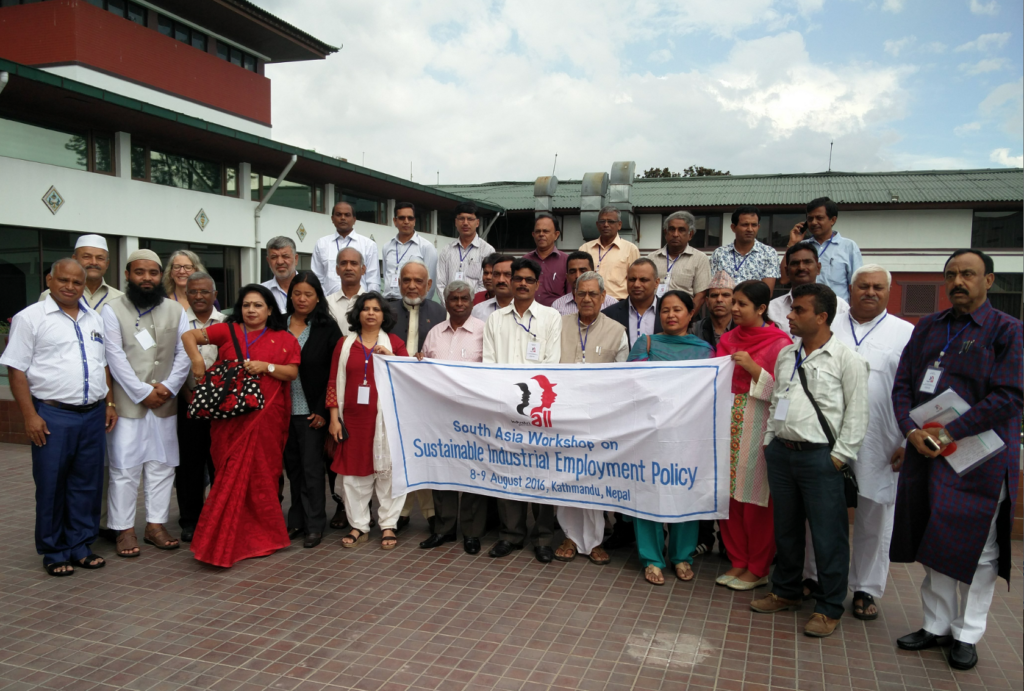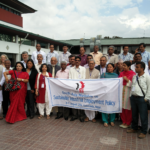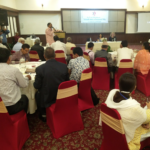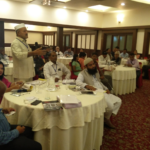11 August, 2016On August 8-9, IndustriALL affiliates from Nepal, Bangladesh, India, Pakistan and Sri Lanka met in Kathmandu to discuss how to implement IndustriALL’s sustainable industrial employment agenda in their countries and to devise a regional strategy.
Affiliates in all five countries noted the negative impacts suffered by workers as a result of poor or non-existent industrial policy-making by governments. Industrial policy has been driven by economic policy and has failed to address labour, social or environmental needs. Deregulation and undermining of labour conditions have been pursued in order to attract FDI, while successive rounds of privatization have weakened health, education, power and transport services that are needed to promote sustainable industrial employment. Affiliates linked industrial policy failures directly to the replacement of permanent employment with precarious work.
The unions pointed to specific problems at national level. In Pakistan, the government announced an industrial policy in 2015, but while the policy itself is good, implementation is zero. In Bangladesh, gas and electricity shortages made it difficult to implement industrial policies, while in Nepal, unions are struggling to deal with the aftermath of last year’s earthquake.
India is still heavily reliant on coal power and faces a big impact from the Paris COP agreement, with investment in the sector currently on hold. There is an enormous need for skills development with many rural youth without skills and therefore unemployable.
Unions analyzed how policies to attract investment and develop industries are negatively impacting on workers’ rights and the environment because these are not being adequately addressed in policy development. The biggest impact has been on freedom of association and collective bargaining, and on outsourcing and precarious work. Cheap labour and low wages have been pursued to ensure higher profits. In Bangladesh, when provision is not made for adequate housing, workers end up in overcrowded and squalid conditions, exploited by landlords.
There has been no proper planning for mining and industries with the result that permission is given for industrial development without effective analysis of the environmental impacts. In India this has resulted in industries being allowed to pump and deplete groundwater, pollute the air and contaminate the groundwater through the burial of waste. Investment is designed to benefit the companies, not the country.
Affiliates face a huge challenge to influence industrial policy-making towards sustainable industrial employment, especially when governments listen only to business and are not interested in trade union views. They will need to use their influence on local members of parliament and political parties sympathetic to union views, as well as develop clear messages and a media strategy. If the union voice is to be heard, they will also need to build unity, increase membership and strengthen unions financially through increasing membership fees.
Next steps for affiliates in all five countries will be to further discuss the issues in their own organisations, with other affiliates and with national centres with the aim of formulating concrete demands around sustainable industrial employment. Where consultative bodies to government exist, the issue will be included in the agenda. Unions in other countries will explore the models of joint union cooperation at national level which exist in India and Nepal.
Sri Lankan affiliates will continue to press the government for a sustainable industrial policy in the context of its proposed employment policy which does not currently consider how industry developments will impact on workers and the environment.
The meeting concluded with a call for solidarity at South Asian level to counter government attempts to undermine labour rights in the name of competing with other countries in the region, and to work towards greater protection for workers in trade agreements both within the region and with other countries.



